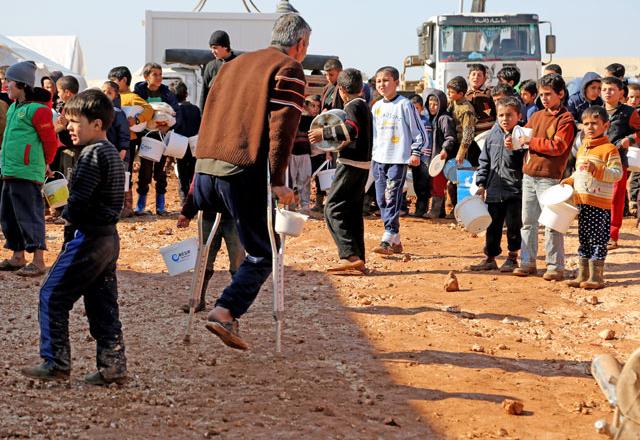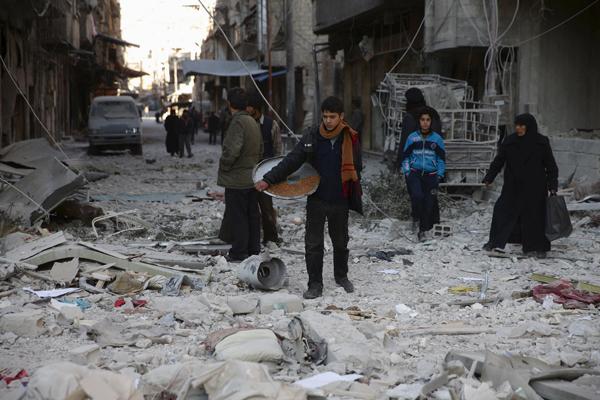You are here
Glimmer of hope as Syria war enters sixth year
By AFP - Mar 12,2016 - Last updated at Mar 12,2016
BEIRUT — Syria's war enters its sixth year next week with a glimmer of hope that a landmark ceasefire and a push for peace could help resolve a conflict that has sent hundreds of thousands fleeing to Europe.
Analysts say the past 12 months have been transformative — with Russia's military intervention and pressure from the migrant crisis pushing world powers into renewed peace efforts.
Inspired by the Arab Spring uprisings of six years ago, protests erupted against President Bashar Assad's regime on March 15, 2011.
A brutal crackdown sparked the civil war, which has since left more than 270,000 people dead, and forced millions to flee towns and cities devastated by bombing and clashes.
Sporadic peace efforts over the next five years failed as fighting raged, with the emergence of the Daesh terror group adding a terrifying new dimension to the conflict.
The last year has seen the war brought home to Europeans as never before, as hundreds of thousands of desperate Syrians arrived on Europe's shores in the continent's worst refugee crisis since World War II.
Experts say the wave of refugees put the Syria crisis front and centre for the West, prompting a surge of diplomatic action.
"Europe's fear about the refugee influx is one of the main factors that led to a reassessment of policies on Syria, making short-term stability a top priority at the expense of other political and geostrategic objectives," said Karim Bitar, an analyst at the Paris-based Institute of International and Strategic Relations.
The biggest international effort yet to resolve the conflict was launched late last year, with diplomats from world powers agreeing a plan for a ceasefire, the creation of a transitional authority and UN-monitored elections.
UN peace envoy Staffan de Mistura said Friday that both parliamentary and presidential elections should be held in Syria 18 months after a fresh round of talks begins on March 14.
A partial truce — which does not include fighting against Daesh and other extremist groups — took effect on February 27.
Russia's intervention in Syria last September marked another major shift, experts said.
"The Russian intervention was undoubtedly a turning point in the Syrian war," said Bitar.
"It allowed a regime that was otherwise losing ground [to rebels] to consolidate its control over 'useful Syria'," or the most populous territories, he said.
The bombing campaign has bolstered Assad, helping him to firm up his grip on power despite years of opposition demands that he step down.
Against all expectations, the partial ceasefire has been holding, and Syria's regime and fragmented opposition will hold new peace talks starting next week in Geneva.
But divisions cut deep and despite the changes on the ground few are holding out much hope for the talks.
The key sticking point — Assad's fate — is far from being resolved, experts say.
Moscow is showing no sign of backing away from its longstanding support for a key ally.
"Russia's intervention dotted the i's in their policy that 'we cannot let Bashar Assad fall'," said Yezid Sayigh, an analyst at the Carnegie Middle East Centre in Beirut.
Washington, which has long supported Syria's opposition, is also unlikely to compromise.
"The US wants at the very least a pledge that Assad will leave in the beginning, during, or at the end of a transitional period, which the Russians still don't accept," Sayigh said.
"This core issue is like trying to square a circle," Bitar said.
If the negotiations collapse — as previous peace talks did in Geneva last month — Sayigh said the ceasefire is likely to soon follow.
"If the truce is not backed by a political accord, violence will return little by little," he said.
The push for peace is also likely to run up against the myriad regional interests at play in Syria, experts said.
Sunni powerhouse Saudi Arabia and its Gulf allies are backing the opposition while Shiite Iran and its Lebanese ally Hizbollah are supporting Assad.
Turkey meanwhile is pounding Kurdish positions in northern Syria, provoking a rare rift between Ankara and its chief NATO ally Washington.
"Regional Sunni powers like Turkey and Saudi Arabia continue to walk a line that is much more intransigent and maximalist than [US President Barack] Obama's administration," Bitar said.
"In Syria, we allowed multiple proxy wars to develop that have nothing to do with the original demands of the Syrian people," he said. "The Syrian people remain the victim of score-settling among world powers."
Related Articles
BEIRUT — Syrian rebels urged President Donald Trump to fulfil a pledge to create safe zones in their country, but analysts doubted he would
DAMASCUS — Syrian authorities on Wednesday arrested two prominent members of the domestic opposition as they travelled to Riyadh to meet oth
DAMASCUS — Syrian authorities have released two prominent members of the domestic opposition who were arrested on Wednesday as they travelle


















